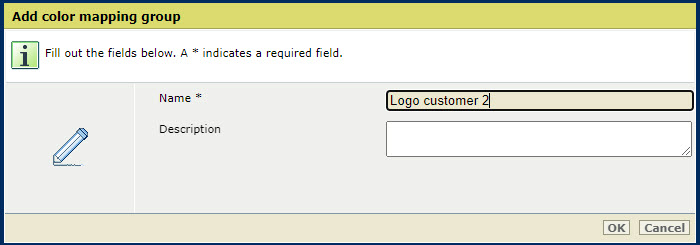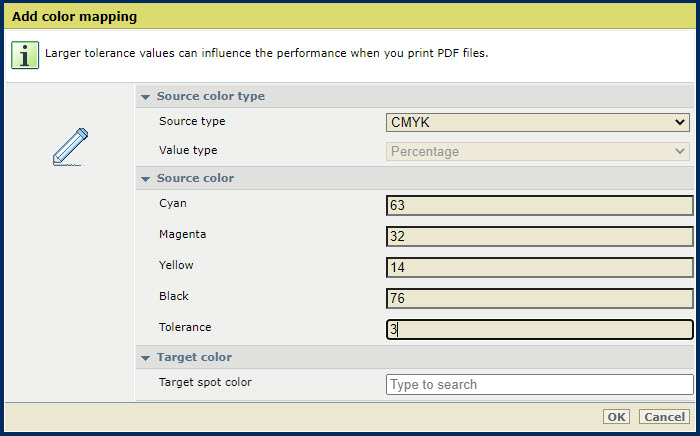

A color mapping is an element that maps (transforms) a source color value into a new target color value. Color mapping is applied during the job RIP process. Color mapping also applies to color bars and information bars.
You add one or more color mappings to a color mapping group. A color mapping group enables the combination of different color mappings. You can assign the color mapping group to a color preset.
Open the Settings Editor and go to: .
 [Color mappings] tab
[Color mappings] tab [Color mappings]
[Color mappings] Click [Add group].
Define a name and description.
 [Add color mapping group]
[Add color mapping group] Click [OK].
Select a color mapping group.
Click [Edit].
Define a name and description.
Select a color mapping group.
Click [Copy].
Define a name and description.
Select a color mapping group.
Click [Add color mapping].
 [Add color mapping]
[Add color mapping] Define the color mapping settings, explained in the table below.
Select a color mapping.
Click [Edit].
Define the color mapping settings, explained in the table below.
Select a color mapping.
Click [Copy].
Define the color mapping settings, explained in the table below.
Select one or more color mappings or color mapping groups.
Click [Delete].
Select the color mapping.
Click [Move].
Select the new color mapping group.
|
Settings |
Description |
|---|---|
|
[Source color type] |
Use the [Source type] drop-down list to select the type of source color.
CMYK colors and spot colors are specified as percentages (0-100). RGB colors can be specified as 8-bit numbers (0-255) or as percentages (0-100). Use the [Value type] to define the format of the RGB value. |
|
[Source color] |
Use the [Source color] setting to define the source color.
Search in the list of spot colors, by entering a part of the spot color name. |
|
[Tolerance] |
Use the [Tolerance] setting to set the tolerance. The tolerance of a source color is expressed as a percentage point. A percentage point is the difference between two percentages. For example, the percentage point between 32% and 30% is 2. The tolerance of a spot color cannot be defined. |
|
[Target color] |
Use the [Target color] setting to define the target color.
Search in the list of installed spot colors, by entering a part of the spot color name. |
|
Spot color |
Description |
|---|---|
|
Cyan, Magenta, Yellow, Black' |
A mapping to one of these (exactly spelled) spot color names prints the primary color instead of the source color. No color management is applied to this target color. |
|
All |
A mapping to this (exactly spelled) spot color name prints all primary colors instead of the source color. This results in rich black. |
|
None |
A mapping of this (exactly spelled) spot color name makes objects invisible on the print. This can be useful to make markers invisible. |